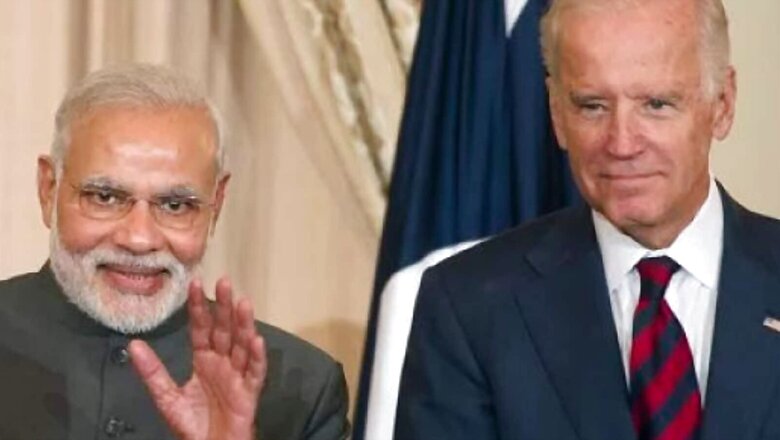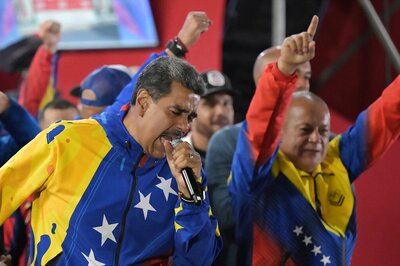
views
This is Modi’s seventh visit to the US since assuming office in 2014 and first since Biden assumed charged as President early this year. Speaking to CNN-News18 in an interview, US-India Business Council Chief Nisha Desai Biswal said that both the leaders have been eagerly anticipating this visit. Biswal said India is hopeful that the meeting would lead to improved economic and trade opportunities between the two countries. Edited excerpts:
What are the concrete outcomes you are expecting from the first in-person bilateral meeting between Prime Minister Narendra Modi and US President Joe Biden?
This visit has been very eagerly anticipated by both President Biden and PM Modi. The two have had numerous occasions to speak on the phone and certainly we saw the virtual meeting of the quad leaders earlier in the year as well. But this is an important meeting for a number of reasons. First of all, as you saw with the global summit that the PM spoke at and president Biden has been speaking about. The collaboration between India and the US in beating the pandemic is very important to both the leaders and will be a major topic of conversation.
Also Read: In Address Ahead of US Visit, PM Modi Gives Sneak Peek Into Power-Packed Plan | FULL STATEMENT
The collaboration between both the countries on the global fight against climate change, I think, will also be a key area of focus and US Special Presidential Envoy for Climate Change, John Kerry, was just in India over the past week. The meeting of the Quad is really happening on the sidelines alongside the bilateral meetings and the meeting is going to focus on important areas of cooperation between the US and India, Australia and Japan, including on advance technology, climate on Covid-19 and on insuring that we continue to see a free and open Indo-Pacific where we have a trade and an opportunity going in multiple directions in the course of four democracies — a key in maintaining the global security, prosperity and inclusive opportunity of the Indo-Pacific. It will be important from the perspective of business between the two countries.
We are also hopeful that the bilateral conversation will talk about increasing and improving the economic and trade opportunities between the two countries. In recent weeks, we have been hearing from the Indian side that they would like to see more and more US investment and higher level of trade. I am hoping that perhaps we can start exploring the possibility of a free trade agreement or a limited trade agreement between the two countries.
Also Read: How PM Modi Spent Time on His Long Flight to the US
The question of trade deal also came up during former US President Donald Trump’s tenure but it never materialised. What have been the hurdles and do you think those hurdles can be overcome now?
Clearly, we have differences in trade and as major economies it is to be expected. But Ithink we’ve also suffered from mismatched expectations on what we wanted to prioritise in a trade agreement. When the US was looking to get the deal done, India was not ready and when India was ready to get the deal done, the US was not ready. One wanted to go big, one wanted to go small, go slow, etc. I think time has come to put aside all of these misalignments and focus on how we align our economies and policies, and achieve something consequential.
For India to meet its strategic ambitions and aspirations, which the US shares and supports, it needs to be a global economic power. And to be a global economic power, it needs to be a part of the global economic system. For the US, we need to overcome the hesitation on trade that has played in prior administration and perhaps in the current administration as well. We need to be leading on trade and I think this visit is an opportunity to have a conversation on those things.
One big learning from the Covid-19 pandemic is that countries and companies do not want to be overdependent on China for manufacturing. Do you think India can step in and provide that alternative?
I think the conversation on de-risking and diversification of the supply chain is happening not only at the White House or in PM’s office … it happening in US boardrooms and across the world. When we talk about de-risking and supply chains, regionalising and diversifying them, we have to make sure that the ecosystem is in place for those supply chains to find a home in India and to be able to achieve long-term investments.
Supply chain investments are big so an ecosystem and a regulatory that allows for stability and long-term planning process with these companies is key. This is the right time for India to make bold moves and we’ve already started to see them. The government has taken some big steps in recent weeks and months around the PLI scheme to attract investment. It is looking at regulatory stability, including a very big move on retroactive tax liability, so all of those things build confidence and there is more that can be done as well.
The CEOs of some companies are going to meet PM Modi as well. What are their expectations? What is it that they are likely to put across to the PM as their expectation or demand from India?
I think it’s very important that the PM is looking at some important future-facing industries — whether it’s on drone technology — a conversation that we understand is likely to happen with General Atomics. Some of the companies that we read about in newspapers … I think the list has been very productive. (There is) deliberation within the Indian government. Some of the companies that we have seen are focused on areas like 5G, artificial intelligence, climate and clean energy technology and financing. I think these are indicative of the fact that India is looking at the future as the PM is positioning India for the future economy and for the advance technology that is going to drive global commerce in the decades to come.
Just ahead of the in-person QUAD summit, we’ve seen the announcement of what’s been called the Ocus. It’s more like a military alliance. Do you think the US is trying to use various means to counter China?
I am not going to speak on what the US’s intention or aspirations are on Ocus but I can tell you about the QUAD framework which frankly was initiated when I was in the government and which has nearly become more and more consequential for all the countries of the QUAD. It’s meant to be not just a strategic or security framework but really a platform where our four democracies can share insight or perspectives and also create a cooperative initiative for some broad spectrum.
You will see that the QUAD in earlier meetings focused on climate, Covid-19 and emerging technologies. I think you will continue to see the broadening of QUAD in many different aspects, including education and a continued focus on Covid. But I do think that there is scope for QUAD as a platform to think about the future economy and to really create a robust economic agenda focused on digital principles and alignment of a digital governance agenda, whether it’s on looking at emerging technologies and how we usher in greater investment and focus on the technologies that are going to be critical for all the nations of the Indo-pacific in the years to come. You will see QUAD grow in importance and expand in its areas of focus.
Read all the Latest News , Breaking News and Ukraine-Russia War Live Updates here.

















Comments
0 comment